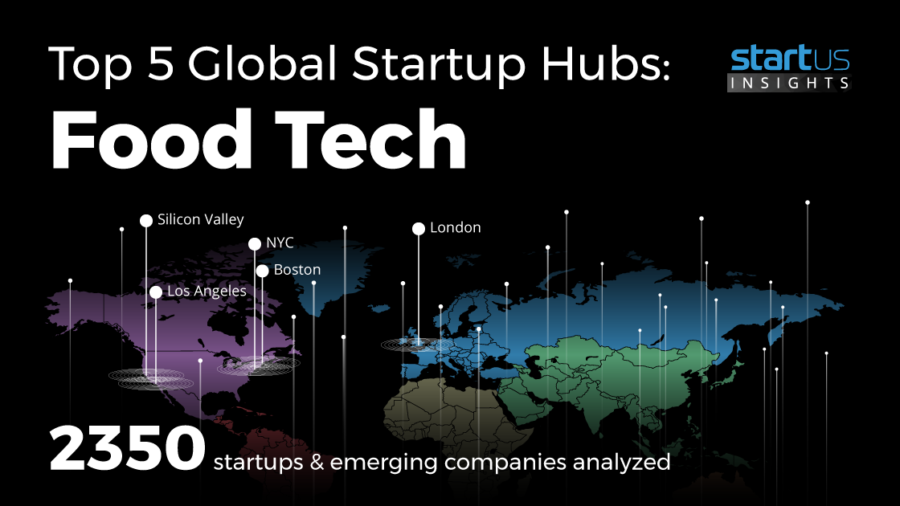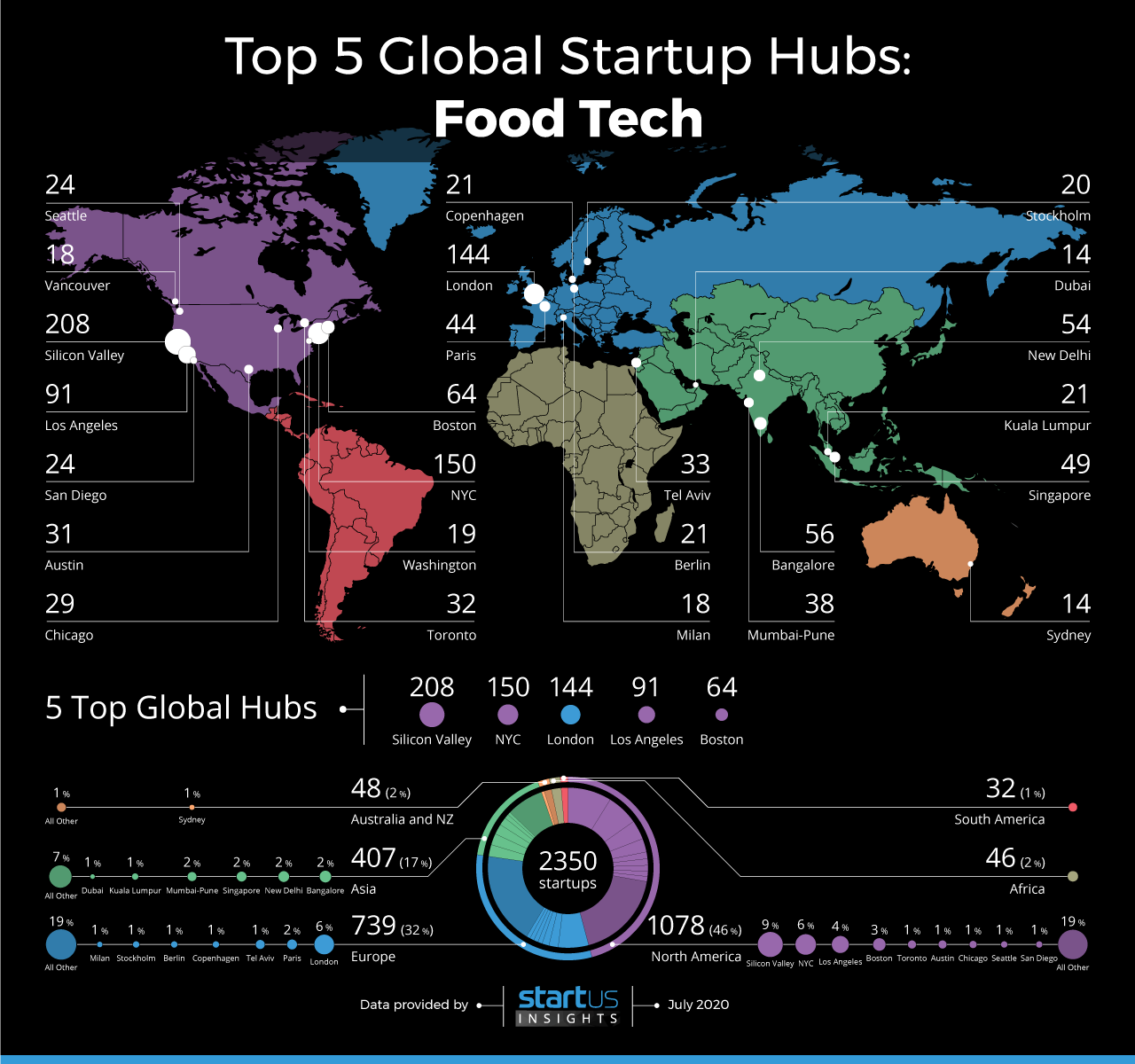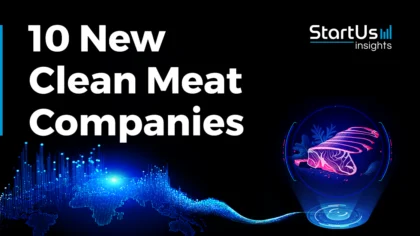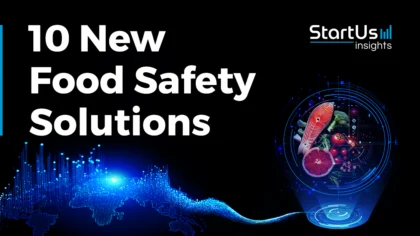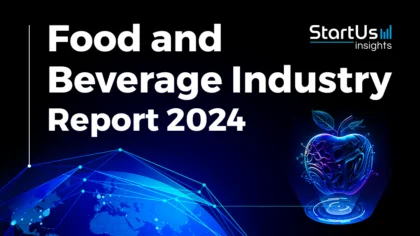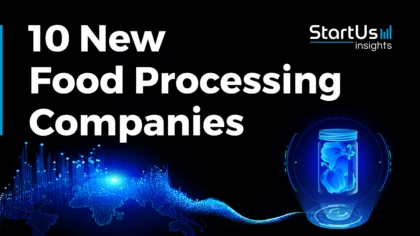Food Tech is an umbrella term for a variety of solutions that explore the use of technology to improve the production or distribution of food. In an increasingly globalized world, the industry makes it possible for consumers to obtain fresh produce from across the world. Also, there is a huge interest in healthier and more sustainable food options. Food tech enables producers to meet this new demand and tackle food poverty in a world where climate change often severely impacts agricultural outcomes. Food tech startups work on a wide range of solutions such as climate-smart farming, transparent supply chains, plant-based proteins, personalized nutrition, restaurant tech, meal-kits, etc. Naturally, they employ almost a variety of technologies, including artificial intelligence (AI), blockchain, satellite imaging, data analytics, robotics, and more. From the life sciences, solutions use techniques from cellular agriculture, genetic engineering, bioinformatics, and microbiome analysis.
Top 5 Global Startup Hubs: Food Tech
Using our StartUs Insights Platform, we analyzed the geographic distribution of global activity in the food tech industry. We identified 54 regional hubs* that observe high activity in developing technology-driven solutions across the industry like AI-powered supply chains, robots for restaurants, and marketplaces, to name a few.
Within the hubs, we analyzed a sample of 2.350 startups* employing technology-driven solutions to innovate in the industry. Silicon Valley, New York City, London, Los Angeles, and Boston are home to 657 startups and account for 28% of global activity in food tech. Let us have a look at some of the innovative solutions from these 5 top hubs.
Based on our analysis of a sample of 2.350 emerging solutions, North America alone accounts for 46% of global activity in the food tech sector. Several large food tech hubs in the US are large tech hubs, particularly with a strong history in agricultural biotechnology, that now look set to disrupt food tech.
European hubs in London, Paris, Tel Aviv, Copenhagen, etc account for 32% of global activity. Emerging Asian hubs in Bangalore, New Delhi, and Singapore lead the region’s activity in the sector.
1. Silicon Valley: 208 Startups
As Silicon Valley brings its digital might to tackle challenges in food tech, startups offer novel use cases for technologies that haven’t traditionally been prevalent in the food industry. Solutions include automation of farm tasks, new models for distribution, and kitchen waste management. With San Francisco being one of the most vegan-friendly cities in the US, many startups in the region work on offering plant-based proteins. THRIVE, a global agrifood innovation platform and accelerator program, promotes the growth of the food tech industry in the region.
Afresh is a Silicon Valley startup that develops a supply chain platform for the fresh food market. The software is built specifically for fresh food and tracks perishability, non-uniformity, quality, seasonality, and other such parameters. Its human-centric AI uses reinforcement learning to assist human operators in making better decisions. By helping grocers optimize their perishables stock, it helps minimize food waste, maximize in-stock rate, and increase profits.
2. New York City: 150 Startups
New York City’s status as one of the top culinary hubs in the world, combined with its tech startup scene, makes it an attractive destination for food tech startups. It is also home to Hunts Point Cooperative Market, the world’s largest food distribution center. New York exemplifies both food tech challenges in an urban setting and how tech can be a tool to tackle them. Focused incubators like Food-X and Bronx CookSpace support the local food businesses in the city.
New York City-based startup Ingest AI builds an AI-powered robotic guest manager (Robo-GM) for restaurants. It keeps operations lean with single-point tracking to save time on data collection and processing. This allows for faster recovery to improve performance metrics and enables the gradual expansion of menus and locations based on performance insights. The solution brings the benefits of automation and analytics to food retailers.
3. London: 144 Startups
The United Kingdom is a leader in the food tech industry in Europe. It was also the earliest to innovate in the field, thanks to its illustrious history in agricultural biotechnology. It has also earmarked a significant portion of the funding under the Industrial Strategy Challenge Fund to transform food production. Startups in the region offer hyperlocal solutions such as e-grocery and food delivery, as well as work on solutions for the developing countries.
Collectiv Food is a London-based startup that develops a direct-to-producer platform connecting food producers with consumers. Their network includes thousands of producers from the UK and abroad selling a variety of meat, seafood, and plant-based proteins. By assuming full responsibility to the food chain, they are able to offer fairer prices to producers, as well as traceability to the buyers. Its points of distribution are refrigerated units in under-utilized urban spaces within London.
4. Los Angeles: 91 Startups
Being one of the most diverse cities in the USA, Los Angeles offers a great diversity of food interests and innovations. The City administration sees promise in the industry for equitable food security, as demonstrated by the use of food maps to help vulnerable residents find the nearest sources of food. Food manufacturing is a major sector in Los Angeles, employing over 100.000 people. As tech companies digitalize operations in the food industry, Los Angeles is in a strong position to benefit from the trend.
Based out of Los Angeles, Outstanding Foods offers plant-based food as an alternative to meat. The startup offers PIG OUT – pigless pork rinds that taste very similar to traditional pork rinds in four different flavors. Their ingredients include rice, sunflower oil, pea protein, pea grits, yeast extract, maltodextrin, etc. Other than vegans, these service people who are looking to reduce consumption of sodium, cholesterol, and trans fats.
5. Boston: 64 Startups
Boston hosts premiere institutions for both life sciences and technology and that is a recipe for a strong talent pool for food tech startups. The city’s biotech startups, that have long dominated its startup scene, now look beyond healthcare and pharma to food tech. Startups in Boston are innovating in the food and beverage sector, food delivery, and next-generation farm tech. Boston also places emphasis on urban farming to increase food system resiliency and food security.
RootAI is a Boston-based startup that develops robotic solutions for indoor farms. Their solution uses computer vision to detect if fruits are ripe and soft robotic grippers to pluck them one at a time. Using sensors to navigate the crowded and complex indoor farm environment, it enhances the efficiency of indoor agriculture. By providing a controlled environment, it eliminates the effects of climate on the quality or quantity of the yield.
What’s next?
Tech-based solutions to challenges in the production and distribution of food are essential to support the growing world population, projected to reach 10 billion by 2050. These solutions address both local challenges, urban spaces, or developing regions and global challenges. Food tech promises to offer food security solutions that are more sustainable and healthier than the existing ones.
*We define a hub as the regional geographic center of activity for this topic. It covers the center point with a radius of 100km. We define startups as those founded after 2015.
